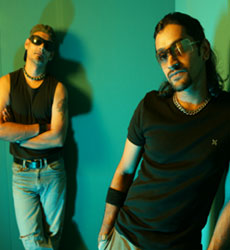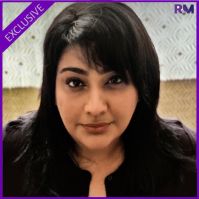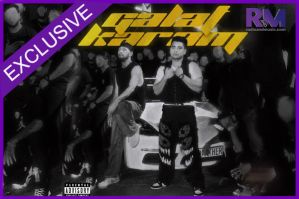Rock band Dream Out Loud - 'Audiences in India are now looking forward to original music'


Dream Out Loud, the rock band, started about two years ago and continues to enthrall audiences with its kick ass live gigs. Chandresh Kudwa is the lead guitarist whose energy packed performances never fail to mesmerise audiences. For an introduction, Suraj is the voice behind some of hit jingles in the ad-world including 'You and I" for Hutch and has established himself as a singer/ songwriter and performer. Radioandmusic.com's Anita Iyer explores the evolution of the rock music scenario in India with the band Dream Out Loud's guitarist Chandresh Kudwa.
Excerpts:
How was the band Dream Out Loud formed?
Chandresh: Both, me and Suraj have been in the rock music scenario for about ten years now individually and Dream Out Loud is just a two year old venture. What drives the band together is our passions towards rock music, in spite of the real bad times we have been through!
How did you come up with the name Dream out loud?
Chandresh: Well, that is something that Suraj would tell you because it was he who conceived it!
Suraj: The way the name was conceived is really funny. We had the album ready for quite some time but didn't have a name for our band for a long time. It happened when I was driving on the highway and was stuck in a traffic jam and there was a guy on a bike in front of me who was wearing a Dream Theatre T-shirt, so I started thinking of names with 'dream' in them and that's how the name came about. Then it just struck me that we were just dreaming about things without things falling in place. So the name, 'Dream out loud'.
How do you promote your band?
Chandresh: It's largely word of mouth publicity in our case. Internet helps us to reach out to any corner of the world, videos put up at our websites help in connecting with people. Also, music channel VH1 has been a great platform to exhibit our work.
Suraj: We have also expanded our reach internationally and have responses from our fans from Germany, Sri Lanka, the US, and Spain because of the exposure via internet.
What are the challenges of being a part of a rock band?
Suraj: The main challenge seems to be the finance part. We are earning our own money and pumping in resources to push this band to the next level. We are self- financed and have to invest in everything - right from music to videos, the making of an album, art work, etc. We might go in for films or do jingles just to ensure resources for our band.
Where does rock music stand today in India?
Suraj: Rock music still has a niche audience and is still not mainstream. Given the choice, it would be just the band but we cannot support the band unless we have some money coming in through other sources, which is why we do jingles and play for films.
Chandresh: There is a niche audience in India for rock music but that niche audience is really big; it's probably more than the population of a small country. Many rock bands like Deep Purple and Iron Maiden are coming to India because they get big audiences here. When Maiden plays abroad, they get an audience of 5000 and here it is around 30,000.
How has rock music evolved in India over the years?
Chandresh: The main reason for the boom of rock music in India is that there is a lot of exposure now and music means more than just MTV. Initially, there were only five music channels and they held a monopoly over the choice of songs to be played on air. But today, there is loads of stuff on the Internet, websites like Youtube, Myspace offer tones of music; the exposure is so much that even a non-rocker can like rock music without knowing it. Earlier, the audience might not have thought of buying a CD to find out what the rock genre is, but now he might just access some rock stuff online.
Suraj: There are some very good bands happening in India, ones that are writing their own stuff. I remember this rock festival in Delhi where about 60 bands played original gigs and were still able to connect with the audiences. Today, the audiences have opened up and are looking forward to original music. The scene has changed a lot in the past few years for the good.
Is there a risk involved when you play originals?
Suraj: Since the time DOL has been around, we have never played covers at all. When you play covers, you become a good musician as you get to learn a lot but do not evolve into composing originals. But if you do not do originals, then you are right at the bottom. Song writing and original compositions require evolution.
Chandresh: Today, the Indian audiences have so much access to international rock music that they don't want the Indian bands to play covers. They are craving for originals and the Indian rock bands are feeding them.
Your guys come from different bands. Why is it that bands split?
Chandresh: I was a part of ten different bands at a time but only a few of them are worth remembering. The band, Freedom did pretty well and most of the other bands have dissolved now. A band is essentially a group of four different people with different goals. But all of them having the same drive to achieve is a rarity!
Suraj: I started with a band named Crisis and lasted for a good six years, then I was a part of Chakraview, which was more of originals. I was also part of various bands for some time like Spirals, but the challenge with the bands is to their ability to stick together.
Is it because of the differences that the bands split?
Chandresh: Differences of opinion are bound to be there, otherwise you are with a group of dumb people lacking creativity. Differences of opinions are basically ideas or opinions, which need to be considered; differences could be at a very pro level where you are trying to say something good for the band or the music. It is good to have opinions but provided they can be solved and come to a particular conclusion.
Suraj: Basically it's the direction. If the direction is clear and each of the band member wishes to reach out the same direction, then differences do not matter. But if each desires to move to opposite direction, it results in band splits.
Chandresh: The best example of it would be, one member in the band wishing to do commercial mainstream because of the money involved and another opposing the idea. If the remaining members are confused who to side with, the bands are bound to split.
What about Dream out Loud? Do you have differences of opinion with the other members in the band?
Chandresh: Differences we rarely have, and they are mostly creative. We also have a reasonable explanation to the ideas we propose, so there is no problem with anything.
Suraj: The whole idea of the band was conceived by the two of us and we are the ones who are driving the band to the next level. We initially thought we would restrict the strength of the band to the two of us and hire artistes whenever needed. So, the other members today include Sonu, the bassist, and then there is Jonathan, the drummer. Now, these guys are getting more involved and it is becoming like a proper band. By the next album, might be these guys will be a part of our band.
What do you think about the current Indian music scenario?
Chandresh: In India, the music content is too cluttered. A single artiste does hard rock, bhangra, hip hop, dance and then love ballads - this doesn't happen anywhere outside India. In one album itself, they have ten different styles and it is confusing to understand who the target audience is, because you cannot target everybody with a single album.
If you listen to a Santana, MJ, linking park or any big or small selling artiste, there is a certain style that they stick to. The artistes might drift a bit but the core remains the same. In the Indian scenario, the artistes don't sound consistent.
Suraj: If a particular kind of music sells, the music companies overdo and exhaust it. In a hurry to make money, the music companies started taking what came their way without giving a thought how to build an artiste. For example, just because one Punjabi artiste became a hit, the music companies went on launching many more and the bhangra genre is exhausted today. It is the overdose of a particular genre that stagnates it.
Are music companies open to the idea of albums with rock bands? How did you come up with your album 'Human race'?
Chandresh: We, as rock artistes are not open to work with music companies. Our first album was an independent label; we produced the album and the video ourselves and even marketed it independently. We have a marketing team handling the promotions, shows and marketing. As we are an independent label, marketing is important to inform people that we exist, then its up to them to take a call whether they like our music or not.
Suraj: Also, one advantage of being an independent label is that there is no dependence on the music companies for finance. This also ensures no dilution of creativity by third party as music companies just tend to finance what sells. There is smooth sailing when there is no music company involved.
How is the international rock band scenario different form the Indian scenario?
Chandresh: As musicians or song writers we are as good as an international act. In the international music scenario, people specialise in each sub field like producing only rock music. Things are more streamlined out there and that's what is lacking here.
Suraj: The music scene there has evolved out of people who are passion driven. Like the first Woodstock didn't make money but that didn't bother them, it took a long time for them to evolve into a big industry. Here the music industry is ruled by Bollywood and there are bands who succumb to Bollywood.
But now, we have reached a stage where the bands are playing originals, audiences are accepting them and the future seems bright. Only the little gap needs to be bridged between the music companies and artistes.
Having performed in India and abroad, how different are the audiences?
Chandresh : Audiences are receptive all over and are more or less the same. Now we have reached a stage, where even the Indian people are sending fan mails. Earlier, Indians were not too open to the concept of Indian bands. There is a sea change in the way rock bands are perceived today in India, the audiences in India have changed for good.
What are your future plans?
Chandresh: We are coming up with a new album next year and work on that album is still on. The name of the album hasn't been decided yet but it's in the process.

















